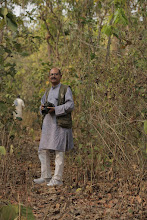A macabre drama is unfolding in the poverty-stricken Indian state of Orissa where a democratically-elected government has begun to crush over a dozen people’s peaceful resistance movements against their forceful eviction from their forest, farm, water bodies and source of livelihood to help giant multi-national corporations usurp mineral-rich forest and fertile agricultural land.
The recent police atrocities on the people of Kalinganagar and Jagatsinghpur may turn out to be a turning point in the state's people's non-violent agitations which have a long and distinguished history of successfully thwarting two nationally important mega projects - the national missile testing range of the defense ministry at Baliapal and the bauxite mining from the Gandhamardan hill by the public sector National Aluminum Corporation (NALCO).
People of Kalinganagar, touted as the steel hub of India, and Jagatsinghpur have been carrying out a non-violent agitation against their displacement to make way for Tata's six-million-ton integrated steel plant and Korean giant Posco's 12-million-ton steel plant respectively. In both the places, the Orissa government, with active collusion of armed goons hired by companies, has launched massive attacks indulging in firing, baton-charge and arson. The government had tried to forcibly evict the people from their villages in 2006 and 2007 too resulting in the death of 14 tribals in Kalinganagar and injuries to many in Jagatsinghpur.
In both Kalinganagar and Jagatsingpur, the government and the companies used agent provocateurs to give a violent-twist to the peaceful sit-in dharnas by the people so as to portray the police action as ‘legitimate’. Stories were planted by the government in a section of the media describing the police action as an inevitable measure to put down violence initiated by the non-violent satyagrahis.
In Kalinganagar, where the police and the hired goons of the company had opened fire injuring over 10 people, including women and, subsequently plundered the houses of non-violent resisters, the government put up a poster purportedly issued by Maoists in support of the people’s movement, a day before the police action on March 30.
The attempt to dub the non-violent resistance movement in Kalinganagar as ‘Maoist inspired’ is a sinister design of the government which follows the popular dictum – ‘To kill the dog, give it a bad name first.’
The government’s exasperation is understandable because the people of Orissa have so far succeeded in stalling not just Tata’s and Posco’s attempt to take possession of the allotted to them for setting up massive steel plants, but have also thwarted London-based Vedanta Resources Plc from carrying out mining from the Niyamgiri hills at Lanjigarh in Kalahandi district.
The 8,000-strong Dongaria tribe residing in the foothills of the Niyamgiri hill in Kalahandi district have been carrying out a resistance movement against the mining of bauxite from the hill top on the ground that their tribal diety Niyamraja resides there and any mining activities would destroy the ecology of the region and deprive them of the their main source of livelihood, which is the forest. The ministry of environment is yet to give its clearance to Orissa Mining Corporation for carrying out mining of bauxite from the hill top. This has adversely impacted the alumina refinery of Vedanta at Lanjigarh.
Vedanta is also facing stiff resistance from the villagers to their proposed ‘world-class’ university on the Konarka-Puri coast on a massive 6,000 acres of land allotted to the company by the state government. The protesting villagers have not allowed Vedanta to take possession of the land. Lok Pal has ordered an inquiry into the alleged corruption in allocation of land from out of the land owned by the Jagannath Temple trust.
Arcelor Mittal’s proposed steel plant in Keonjhar district too has not been able to take off due to stiff opposition from the people who are likely to be displaced by the project. Though the Orissa government had committed to 8,000 acres in Keonjhar district for the proposed Arcelor Mittal steel plant at the time of signing the MoU in 2006, it has not yet been able to provide any land. The process has been delayed due to agitation by displaced families under the banner of Mittal Pratirodh Manch as most of the land is fertile agricultural land.

No comments:
Post a Comment